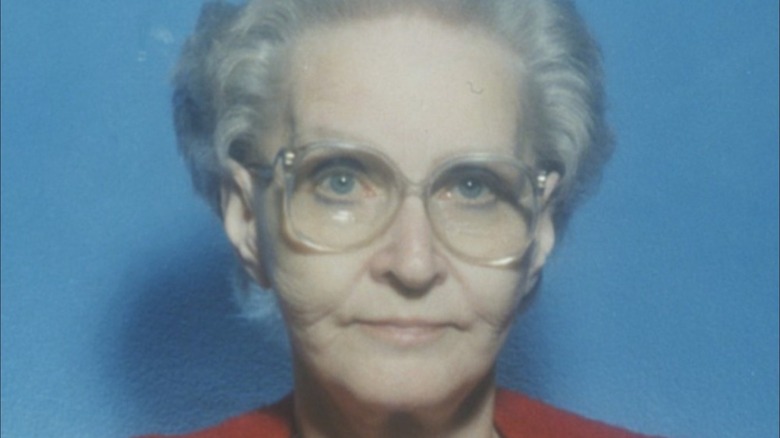Inside Dorothea Puente's Tragic Childhood
Disguised as a kind-hearted boarding house owner, Dorothea Puente allegedly murdered tenants who lived on her property, and buried them in her backyard, according to the Los Angeles Times. Puente's crimes were featured on the Netflix show, "Worst Roommate Ever," a true-crime show that documents cases of dangerous and deadly roommates (via ScreenRant).
As the owner of an unlicensed boarding home, Puente seemed like a savior to people who lived in the shadows, reports the Los Angeles Times. She opened her boarding home to disabled people, older adults, drug abusers, and alcoholics. According to Sactown Magazine, social workers loved that she would take in their "ailing or most erratic clients" when no one else would.
According to Bustle, Puente fooled people by telling them she was about 15 years older than she actually was. She wore large glasses and a dressing gown, and for years, the grandmotherly disguise tricked tenants, police, and social workers into thinking she was a kind and trustworthy caregiver. Puente would drug her tenants with tranquilizers, fake their signatures, then steal their checks, money, or other valuables.
The Los Angeles Times reports that Puente kept collecting Social Security checks from her older victims, and she was accused of stealing around $87,000 total. In 1988, an investigation was opened when a mentally disabled man went missing from Puente's house (via Bustle).
Then, in a shocking scandal that made national news, investigators discovered that Puente had killed and buried at least seven of her victims in her backyard (via Los Angeles Times).
A killer's sweet demeanor
Dorothea Puente served a life sentence without chance of parole after being convicted on murder charges in 1993. However, she always maintained that she was innocent of the crimes.
Puente started by working at and later operating brothels, and later went on to operate unlicensed boarding houses, reports Murderpedia. She had four marriages throughout her life which failed, and whenever she was without a husband's income, it left Puente to make money by any means necessary.
How did she end up operating numerous boarding houses? Well, Puente could quickly gain credibility with local social workers. Even after being arrested numerous times, her sweet demeanor charmed people into believing she was a legitimate operator. Per Sactown Magazine, it often seemed like she wanted to help her tenants, but ended up killing them instead.
Behind the scenes of her life, she had a tragic childhood, which had lasting impacts into her teenage and adult years. So what happened in the early years of her life?
Dorothea's early years
Dorothea Puente was diagnosed as a schizophrenic who was also known to lie — and the details about her early childhood are often hard to confirm due to her tall tales about her past. As Murderpedia reports, she was born on January 9, 1929, in San Bernardino County, California. She was given the name Dorothea Helen Gray, and grew up in a big family, as the sixth of seven children (via Sactown Magazine). Their family was poor, and her parents, Trudie Gray and Jesse James Gray, were usually inattentive, using illicit substances or drinking alcohol.
Puente's father reportedly picked cotton, but even with his income, the children had to find their own food (via Murderpedia). She has said that both parents were abusive. Puente's father would sometimes hold a gun to his head and threaten to end his life, even while his children were in the room with him (per the Los Angeles Times).
When she was 8 years old, Puente's father died of tuberculosis (via Sactown Magazine). The Gray children were left with their mother, Trudie. But Puente's mother was an alcoholic, and she often abandoned her kids. The Los Angeles Times reports that Trudie Puente was a sex worker. Trudie lost custody of the seven children in 1938, and the same year, she got into a bad motorcycle accident and died (via Sactown Magazine).
First time in prison
The Gray children were now orphaned, and the seven kids were split up among family members (via Murderpedia). Dorothea Puente moved to Napa, California, when she was 13. Bustle reports that Puente was moved between different foster homes. And according to the Los Angeles Times, she experienced sexual abuse after being placed in an orphanage.
But there are conflicting accounts about her childhood. According to Murderpedia, Puente actually went to school in Los Angeles through her teenage years. Her deceit became clear for the first time when at age 16, she began telling people she was 30 years old. She began going by a fake name, Sherri, in 1945.
According to Murderpedia, Puente sometimes lied that she had 18 siblings, and they grew up in Mexico, not California. Her husbands and friends believed that she embellished her life to seem more interesting: she told people that she was related to Rita Hayworth, that her sister was the Ambassador of Sweden, that she lived through the Hiroshima bombing, and plenty of other falsehoods.
Undoing a painful childhood
Per SacTown Magazine, a forensic psychiatrist named William Vicary spoke with Puente while she was in prison. He diagnosed her with antisocial personality disorder, identifiable by her consistent lies and lack of remorse towards others. He also noted that she had become paranoid and agitated before she went to trial. According to a juror in the case, Honey Hewlett, in the courtroom, Puente appeared "motionless and emotionless."
Per SacTown Magazine, Vicary believes that Puente's desire to run a boarding house stemmed from a longing to "undo painful childhood memories." He believes that she acted deceitfully in order to feel important and respected by those around her. She maintained her innocence in the murder cases to avoid humiliation.
He shed light on Puente's intentions, saying, "I think she truly wanted to rehabilitate [her tenants] as she could not the people in her own family. On the other hand, when these people, as could be expected, would act up — at that point, she snapped and decided to kill them."
Until her tenants' disappearance finally got attention from police, Dorothea Puente got away with numerous murders (via Murderpedia). She had a complicated childhood that would go on to affect the rest of her life. With the mistreatment from her parents and their eventual deaths, Puente had a difficult start that led to her tumultuous teenage years and adult life — and Puente ended up endangering the most vulnerable people around her.




